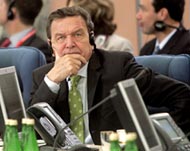Germany’s Merkel to run for chancellor
German conservative leader Angela Merkel has been confirmed as the main challenger to Chancellor Gerhard Schroeder in a poll expected in September.

Merkel, 50, will be Germany’s first woman chancellor and the first from former communist East Germany if she wins the early election that was unexpectedly announced by Schroeder after his Social Democrats (SPD) suffered a heavy loss in a regional poll just over a week ago.
She now faces the challenge of shaping a coherent policy platform before the election, expected to take place on 18 September.
And by making jobs a top campaign issue on Monday, Merkel looks set to tackle Schroeder on what many voters see as his main failing.
“At the centre of my thoughts and actions is finding ways of creating work for people in Germany,” Merkel told reporters and cheering party workers at the Berlin headquarters of her Christian Democrat (CDU) party on Monday.
Unemployment
The CDU hold a commanding lead in opinion polls as Schroeder and the SPD have been hurt by record jobless figures, tottering public finances and a stagnant economy.
Having come to office in 1998 pledging to cut unemployment below 3.5 million, Schroeder has presided over a rise in jobless numbers to about five million. The rate topped 12% this year – the highest level since the second world war.
|
“At the centre of my thoughts and actions is finding ways of creating work for people in Germany” Angela Merkel, |
Often derided as dour and unappealing to voters, Merkel’s personal popularity has overtaken Schroeder’s for the first time, according to opinion polls issued at the weekend.
She said the French rejection of the new European Union constitution in a referendum at the weekend underlined the need for politicians to listen more closely to voters, and she repeated her opposition to Turkey joining the EU.
“This alienation between Europe and its public must be overcome and therefore in my opinion we need an honest debate about Turkish membership,” she said.
Formal confirmation of the expected selection came after a meeting with officials from the CDU’s Bavarian sister party, the Christian Social Union (CSU) whose leader Edmund Stoiber led a failed conservative challenge against Schroeder in 2002.
Tax overhaul
“Angela Merkel has the full confidence and support of the CDU and CSU,” Stoiber told a news conference.
Details of similar conservative measures in key areas like tax and social security have been sketchy and the party is not expected to present its platform until 11 July.
But Merkel said she would propose a major overhaul of the tax system as part of a broad platform of structural reform.
 |
|
Gerhard Schroeder is lagging |
If the conservatives win, their task in government will be eased by their domination of the upper house of parliament, the Bundesrat, which has blocked numerous proposals from Schroeder.
Merkel has in the past proposed far-reaching reforms for Germany’s tax, welfare and labour markets and the conservatives are expected to move in broadly the same direction as Schroeder’s own economic reform programme, dubbed “Agenda 2010”.
But her more radical proposals, which earned her the nickname “Maggie” Merkel after former British prime minister Margaret Thatcher, have since been watered down and are far less drastic than those driven through by Britain’s Iron Lady.
‘Cold reformer’
On Monday, she was at pains to play down her image as a cold reformer, saying her policies would not exclude those without an organised interest group to represent them. “We will not agree an election programme that shuts anyone out,” she said.
As a childless Protestant woman from the east, Merkel has been something of an outsider in a party traditionally dominated by Catholic family men from western and southern Germany.
That has in some ways made her more comfortable with big changes to the status quo.
But commentators say she must still convince a socially conservative party base of the case for major change in Germany, in what may be as big a challenge as it was for Schroeder.